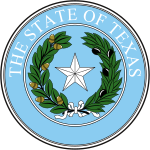1932 Texas gubernatorial election
| |||||||||||||||||
| Turnout | 70.3% | ||||||||||||||||
|---|---|---|---|---|---|---|---|---|---|---|---|---|---|---|---|---|---|
| |||||||||||||||||
 County results[a] Ferguson: 50–60% 60–70% 70–80% 80–90% 90-100% Bullington: 50–60% 60–70% 70–80% Tie: Not Reported: | |||||||||||||||||
| |||||||||||||||||
| Elections in Texas |
|---|
 |
|
|
The 1932 Texas gubernatorial election was held on November 8, 1932, to elect the Governor of Texas. Democratic nominee and former Governor of Texas Miriam A. Ferguson defeated Republican nominee Orville Bullington.[2]
Democratic primary
[edit]The Democratic primary election was held on July 23, 1932. As no candidate won a majority of votes, there was a run-off on August 27, 1932, between the two highest ranking candidates former Governor of Texas Miriam A. Ferguson and incumbent Governor of Texas Ross S. Sterling. Ferguson would eventually win the primary with 50.20% against Sterling, which marked the closest primary defeat for an incumbent governor in United States history.[3]
Candidates
[edit]- Miriam A. Ferguson, former Governor.
- Ross S. Sterling, incumbent Governor.
- Tom F. Hunter, attorney.[4]
- M. H. Wolfe, former chairman of the Democratic state executive committee, and prohibition advocate.[5]
- George W. Armstrong, Attorney, Oilman, Rancher. withdrew to run as an Independent on July 4, 1932.[6][7]
- Roger Q. Evans, of San Antonio.
- Frank Putnam, anti-prohibition advocate[8]
- C. A. Frakes, of Port Arthur.
- J. Ed Glenn, hitch-hiker.[9]
Results
[edit]| Party | Candidate | Votes | % | |
|---|---|---|---|---|
| Democratic | Miriam A. Ferguson | 402,238 | 41.56 | |
| Democratic | Ross S. Sterling | 296,383 | 30.62 | |
| Democratic | Tom F. Hunter | 220,391 | 22.77 | |
| Democratic | M. H. Wolfe | 32,241 | 3.33 | |
| Democratic | George W. Armstrong | 5,312 | 0.55 | |
| Democratic | Roger Q. Evans | 3,974 | 0.41 | |
| Democratic | Frank Putnam | 2,962 | 0.31 | |
| Democratic | C. A. Frakes | 2,338 | 0.24 | |
| Democratic | J. Ed Glenn | 2,089 | 0.22 | |
| Total votes | 967,928 | 100.0 | ||

- 50–60%
- 60–70%
- 70-80%
- 80-90%
- 50–60%
- 60–70%
- 70-80%
- 80-90%
- >90%
- 50%

- 30–40%
- 40–50%
- 50–60%
- 60–70%
- 70-80%
- 20–30%
- 30–40%
- 40–50%
- 50–60%
- 60–70%
- 70-80%
- 80-90%
- >90%
- 30–40%
- 40–50%
- 50–60%
- 60–70%
- 30-40%
| Party | Candidate | Votes | % | |
|---|---|---|---|---|
| Democratic | Miriam A. Ferguson | 477,644 | 50.20 | |
| Democratic | Ross S. Sterling | 473,846 | 49.80 | |
| Total votes | 951,490 | 100.0 | ||
Republican convention
[edit]The Republican convention was held on August 9th, 1932. In the months leading up to the convention, John F. Grant was seen as the likely nominee but in the days before the event a movement to nominate Orville Bullington began to grow. Bullington had not sought the parties nomination but party leaders thought that he was their strongest candidate and backed him regardless.[12]
Candidates
[edit]- Orville Bullington, Attorney
- John F. Grant, Lumberman
- George C. Hopkins, of Dallas
Results
[edit]During the convention Grant withdrew his candidacy and Bullington was nominated unanimously. In his convention speech Bullington came out strongly in favor of prohibition and pledged to uphold the Eighteenth Amendment. The Nomination of Bullington temporarily divided the party and R. B. Creager threatened to back Grant if he opposed Bullington. Grant, however, chose not to challenge Bullington, thus avoiding a split.[13][14][15]
General election
[edit]Similar to her 1924 campaign, Ferguson's candidacy saw a large number of defections.[16] After his lawsuit to keep Ferguson off of the ballot failed,[17] Democratic incumbent Ross Sterling crossed party lines to endorse Orville Bullington.[18] On election day, November 8, 1932, Democratic nominee Miriam A. Ferguson won re-election by a margin of 204,805 votes against her foremost opponent Republican nominee Orville Bullington, thereby retaining Democratic control over the office of Governor. By contrast, Franklin D. Roosevelt defeated Herbert Hoover by a margin of 662,389 votes in the concurrent presidential election.[19] Ferguson was sworn in as the 32nd Governor of Texas on January 17, 1933.[20]
Candidates
[edit]- George W. Armstrong (Jacksonian Democrat)[21]
- Orville Bullington (Republican), businessman and member of the Texas Republican Executive Committee.[22]
- George Clifton Edwards (Socialist)
- Miriam A. Ferguson (Democratic), former Governor of Texas
- Otho L. Heitt (Liberty)
- Philip L. Howe (Communist)
Results
[edit]| Party | Candidate | Votes | % | |
|---|---|---|---|---|
| Democratic | Miriam A. Ferguson | 522,395 | 61.98 | |
| Republican | Orville Bullington | 317,590 | 37.68 | |
| Socialist | George Clifton Edwards | 1,873 | 0.22 | |
| Democratic | George W. Armstrong | 768 | 0.09 | |
| Communist | Philip L. Howe | 138 | 0.02 | |
| Liberty | Otho L. Heitt | 134 | 0.09 | |
| Total votes | 843,898 | 100.00 | ||
| Democratic hold | ||||
References
[edit]- ^ "Texas Almanac, 1939-1940". Portal to Texas History. Retrieved July 31, 2024.
- ^ John D. Huddleston (June 12, 2010). "Ferguson, Miriam Amanda Wallace". Handbook of Texas Online. Texas State Historical Association.
- ^ "A Failure to Launch? Kansas' Republican Gubernatorial Contest and the History of Incumbent Governor Primary Performance – Sabato's Crystal Ball".
- ^ Hunter, Ann Cox (April 2, 1981). "1612 Buchanan". Witchita Falls Cultural Resources Survey. Witchita Falls, Texas. Retrieved November 5, 2023.
- ^ "Texas Demos". Brownsville Herald. Brownsville, Texas. July 19, 1932. p. 8. Retrieved July 3, 2024 – via Chronicling America: Historic American Newspapers at the Library of Congress.
- ^ "Armstrong, George Washington". TSHA. November 1, 1994. Retrieved July 3, 2024.
- ^ "Armstrong Quits". Brownsville Herald. Brownsville, Texas. July 4, 1932. p. 1. Retrieved July 3, 2024 – via Chronicling America: Historic American Newspapers at the Library of Congress.
- ^ "Ferguson Campaigning". Brownsville Herald. Brownsville, Texas. May 16, 1932. p. 6. Retrieved July 3, 2024 – via Chronicling America: Historic American Newspapers at the Library of Congress.
- ^ "State Races Grow Heated; 2 Weeks Left". Brownsville Herald. Brownsville, Texas. July 11, 1932. p. 6. Retrieved July 3, 2024 – via Chronicling America: Historic American Newspapers at the Library of Congress.
- ^ "TX Governor – D Primary". ourcampaigns.com. January 13, 2010. Retrieved May 11, 2023.
- ^ "TX Governor – D Primary Runoff". ourcampaigns.com. January 13, 2010. Retrieved July 29, 2024.
- ^ "Texas G.O.P." Henderson Daily News. Henderson, Texas. August 10, 1932. p. 2. Retrieved July 4, 2024.
- ^ "Bullington Is Nominated". The Daily Tribune. Bay City, Texas. August 10, 1932. p. 1. Retrieved July 4, 2024 – via Portal to Texas History.
- ^ "G. O. P. Sentiment Turns From Grant". Brownsville Herald. Brownsville, Texas. August 8, 1932. p. 1. Retrieved July 4, 2024 – via Chronicling America: Historic American Newspapers at the Library of Congress.
- ^ "Grant Complains". Brownsville Herald. Brownsville, Texas. August 22, 1932. p. 1. Retrieved July 4, 2024 – via Chronicling America: Historic American Newspapers at the Library of Congress.
- ^ Duckworth, Allen (1947). "Democratic Dilemma in Texas". Southwest Review. 32 (1). Southern Methodist University: 34–40. JSTOR 43466794.
- ^ Associated Press (October 9, 1932). "Mrs. Ferguson's Name To Go on Dem Ballot". Brownsville Herald. Vol. 41, no. 83. Retrieved November 4, 2023 – via Chronicling America: Historic American Newspapers at the Library of Congress.
- ^ "Sterling for Republican: Wearing Bullington Button Denotes Party Change". Lawrence Journal-World. Vol. 76, no. 253. Lawrence, Kansas. October 21, 1932. Retrieved November 4, 2023.
- ^ "1932 Presidential General Election Results – Texas". Dave Leip's Atlas of U.S. Presidential Elections. Retrieved February 7, 2013.
- ^ "TX Governor". ourcampaigns.com. June 26, 2006. Retrieved May 11, 2023.
- ^ "The Last Populist – George Washington Armstrong and the Texas Gubernatorial Election of 1932". East Texas Historical Assosiation. 2002. Retrieved July 4, 2024.
- ^ Olien, Roger M. (1981). From Token to Triumph: The Texas Republicans Since 1920. Dallas, Texas: Southern Methodist University Press. p. 62. Retrieved November 4, 2023.
- ^ Map only includes the results for Ferguson and Bullington, as other results were not included in the data.


